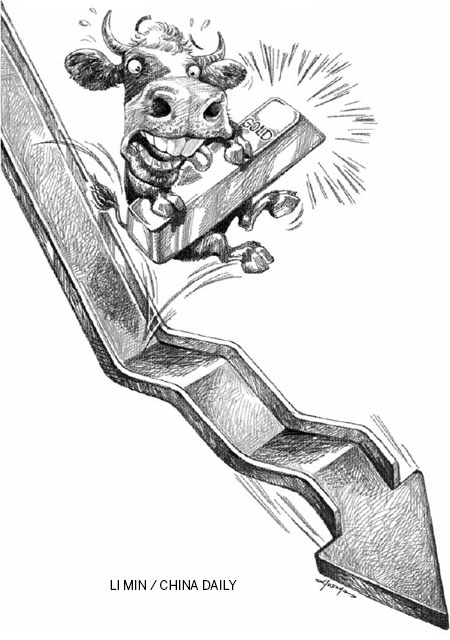


After a decade-long bull market, investors appear to have fallen out of love with gold. The dramatic collapse in prices that began on April 12 has certainly undermined confidence in the precious metal and left many wondering whether it could ever be regarded as a safe haven again. In fact, sentiment has been weakening for some time, reflected in the large outflows from gold exchange-traded funds and fading enthusiasm for gold among speculators in the US futures market.
Nonetheless, the trigger for the recent slump appears to have been aggressive selling by a handful of traders, rather than the reversal of the fundamental drivers that have lifted gold prices in the past and may well do so again. Indeed, none of the fundamental explanations being discussed for the slump in gold prices really makes sense. One is the possibility that the troubled eurozone countries will be forced to sell their official reserves of the precious metal.
However, it is not even certain that Cyprus, whose holdings are tiny anyway, will actually sell any gold. What's more, if the crisis in the eurozone does escalate to the point where other, larger countries were desperate enough to consider dipping into their own reserves, demand for safe havens would surely be so strong that there would be plenty of willing buyers for this gold - even at higher prices.
Another fundamental explanation for the recent slump in gold prices is the possibility that the US Federal Reserve might scale back its asset purchases under quantitative easing (QE3) later in the year. Rising (real) yields could also reduce the attractiveness of an asset, like gold, which pays no income.
But, if anything, the weakness of the latest US economic data has made it less likely for the Fed to withdraw its monetary stimulus any time soon. Indeed, global bond yields have actually been falling in recent weeks, in part because of the prospect of additional monetary easing from Bank of Japan, the country's central bank.
Alternatively, market sentiment may simply have been turned by the bearish note issued by a well-known US investment bank recently. But while their timing has been impeccable, the bears do not appear to have made any new arguments. Their emphasis on the risks to the price of gold posed by a stronger global economic recovery and by rising interest rates certainly looks increasingly misplaced, or at least premature.
 The challengers set to take on AlphaGo in May
The challengers set to take on AlphaGo in May
 Top 10 most popular cities during Qingming holiday
Top 10 most popular cities during Qingming holiday
 Xiongan New Area: Govt building becomes tourist attraction
Xiongan New Area: Govt building becomes tourist attraction
 E China's rooftop photovoltaic power station generates 75m kWh of electricity
E China's rooftop photovoltaic power station generates 75m kWh of electricity
 How Chinese gave new life to Maine lobsters
How Chinese gave new life to Maine lobsters
 Pic story of Finnish airline Finnair
Pic story of Finnish airline Finnair
 Cat 'waiters' welcome guests in Beijing
Cat 'waiters' welcome guests in Beijing
 Farmers harvest tea leaves before Qingming Festival
Farmers harvest tea leaves before Qingming Festival